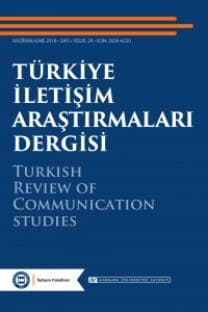Ulrich Beck’in Risk Toplumu Teorisi Çerçevesinden Covid-19 Pandemi Sürecinin Değerlendirilmesi
Risk, yaşam var olduğundan beri insanlığın karşılaştığı tehlike ve tehdit durumlarını ifade etmektedir. İnsanlık riskleri bertaraf etmek için ilk çağlardan günümüze kadar geçen dönemde bilim ve teknolojinin gücünü kullanarak doğaya müdahale etmeyi öğrenmiştir. Doğaya müdahale günümüzde o kadar çok ileri gitmiştir ki Beck’in risk toplumu teorisinde ifade ettiği şekliyle doğa yapay bir duruma dönüşmüştür. Dolayısıyla eskisinden çok daha fazla risklerle dolu bir dünya ortaya çıkmıştır. Risk toplumu teorisinde Beck’in küreselleşmenin etkisiyle ülkeler arasında sınırların bir anlamının kalmadığını ifade etmesi Covid-19 pandemi sürecinde dünyanın herhangi bir köşesinde ortaya çıkan pandeminin bütün ülkeleri kısa sürede ve hızla etkiler hale gelmesi açısından önemli bir değerlendirmedir. Bu çalışma, Beck’in risk toplumu teorisinde dile getirdiği küreselleşme, bumerang etkisi, gerçeğe susamışlık, sosyal eşitsizlik, riskin inkârı, risk pazarlaması, bireyselleşme, bilimin yetersizliği ve itibar kaybı, medyanın riski sunuş biçimi konuları ile bağlantılı olarak pandemi süreci üzerinden değerlendirilmektedir. Pandeminin sebeplerinin ve ortaya çıkan sonuçlarının Beck’in risk toplumu teorisinde ortaya koyduğu sonuçlar ile örtüşmesi önemsenecek niteliktedir.
Anahtar Kelimeler:
Risk Toplumu Teorisi, Ulrich Beck, Sağlık, Risk, Covid-19, Covid-19 Pandemisi
The Evaluation of Covid-19 Pandemic Process form the Framework of Ulrich Beck’s Risk Society Theory
Risk refers to the situations of danger and threat that humanity has faced since life has existed. Humanity has learned to intervene in nature by using the power of science and technology to eliminate risks from the earliest ages to the present day. Today, interference with nature has gone so far that nature has turned into an artificial state, as Beck expressed in the theory of a risk society. Therefore, a world has emerged as full of risks much more than before. Beck’s statement that there is no sense of borders between countries due to the impact of globalization in his theory is an important evaluation in terms of the fact that the pandemic that occurs in any region of the world in the Covid-19 pandemic period affects fast all countries in a very short time. In this study, globalization, boomerang effect, thirst for truth, social inequality, risk denial, risk marketing, individualization, lack of science and loss of reputation, the way the media presents risk are evaluated through the pandemic period in connection with the issues expressed by Beck in his theory. It is significant that the results revealed by Beck coincide with the causes of the pandemic and its consequences.
Keywords:
Ulrich Beck, Risk, Theory of Risk Society, Covid-19, Covid-19 Pandemic,
___
- Beck, U. (2002). The terrorist threat: World risk society revisited. Theory, Culture & Society, 19(4), 39-55.
- Beck, U. (2011). Risk toplumu: Başka bir modernliğe doğru (K. Özdoğan & B. Doğan, Çev.). İstanbul: İthaki Yayınları.
- Eysenbach, G. (2002). İnfodemiology: The epidemiology of (mis) information. The American journal of medicine, 113(9), 763-5.
- ICER(2020) icer.org. 19.10.2021 tarihinde http://icer.org/wp-content/uploads/2020/11/ICER-COVID_ Updated_Report_11102020.pdf adresinden edinilmiştir.
- WHO (2020). who.int. 19.10.2021 tarihinde https://www.who.int/health-topics/infodemic#tab=tab_1adresinden edinilmiştir.
- WHO (2020). who.int. 19.10.2021 tarihinde https://www.who.int/news/item/11-12-2020-call-for-actionmanaging- the-infodemicadresinden edinilmiştir.
- Başlangıç: 1992
- Yayıncı: Marmara Üniversitesi
